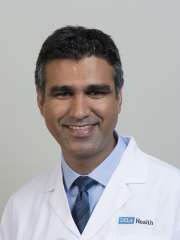Research
Find your care
At UCLA Health, you receive world-class care from a team of experts in pulmonary vascular disease. Call to connect with a specialist.

Research Program – Pulmonary Vascular Disease
The UCLA Pulmonary Vascular Disease research program is a collaborative effort among patients, providers and scientists. The program has several types of pulmonary vascular disease research:
- Basic research — Experimental work carried out in a laboratory helps the center to better understand the fundamental cellular mechanisms of pulmonary vascular disease.
- Clinical Research — Clinical research includes both observational studies and clinical trials that use the knowledge gained in basic research to study the benefits of new drugs.
- Database/registry — The UCLA Pulmonary Vascular Disease registry has an ongoing longitudinal research database and biorepository study. This database is a rich source of data and biologic specimens for investigators.
Patients may be asked if they are interested in participating in a research study. Participation is voluntary. The choice of whether or not to participate in a research study will not impact patient care in any way. Research funding comes from a variety of public and private sources.
Give to the Pulmonary Vascular Disease Program >
To become involved in a research study
Speak with the physicians in the UCLA Pulmonary Vascular Disease Program about potential research studies.
View Our Active Clinical Trials(Link opens in new window)
Lloyd Liang
Clinical Research Project Manager
Harold Te
Clinical Research Coordinator
Basic Research
We seek to better understand the molecular and cellular mechanisms of pulmonary arterial hypertension to find more effective therapies and ultimately a cure for patients. To further this goal, we employ a multifaceted and translational research strategy that combines experimental investigations using clinical specimens from patients enrolled in our studies, preclinical models of pulmonary arterial hypertension utilizing in vitro and in vivo techniques, and systems biology approaches leveraging cutting-edge sequencing technologies and multidimensional omics.
Investigators:

Mansoureh Eghbali, PhD
Professor of Anesthesiology and Perioperative Medicine
Director, Physician Scientist Training Program
Director, Basic Science Training Environment

Jason Hong, MD, PhD
Health Sciences Assistant Clinical Professor

Airie Kim, MD, PhD
Health Sciences Associate Clinical Professor

Gregoire Ruffenach, PhD
Assistant Project Scientist

Soban Umar, MD, PhD
Associate Professor of Anesthesiology and Perioperative Medicine
Residency Research Coordinator, Anesthesiology Residency Program

Xia Yang, PhD
Professor of Integrative Biology & Physiology